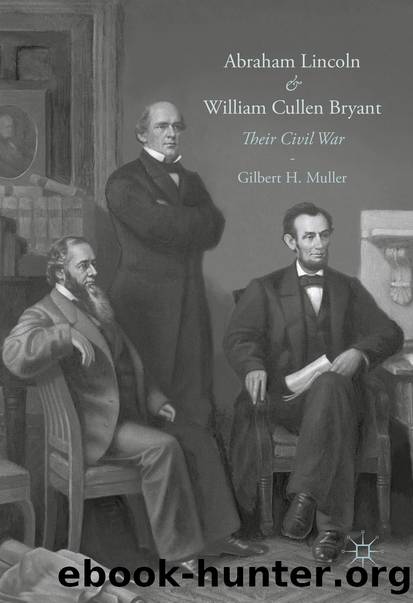Abraham Lincoln and William Cullen Bryant by Gilbert H. Muller

Author:Gilbert H. Muller
Language: eng
Format: epub
Publisher: Springer International Publishing, Cham
Bryant ascribed the wave of Republican defeats in the midterm elections to âthe prevailing discontent with the conduct of the Administration.â He was confident, however, that the Emancipation Proclamation had little effect on the outcome of the fall elections. Instead, he asserted that the Proclamation highlighted the inherent incompatibility between slave and free societies. Bryant depicted this primal clash with figurative flair: âIt is like yoking a drudge ox and the winged-horse Pegasus in the same traces; they will not pull together; and our incessant struggle rages between them.â Then, dispensing with figurative language, he leveled a savage attack on the âbarbarismâ inherent in slave society, which reflected the âvery antipodes of democracy.â Slave society was predicated on âa brutal helot class, an ignorant and vicious low white class, and an imperative rich aristocratic class.â By contrast, a free society was based on âthe moral life of the communityâ; such a society, modernist in essence, served as a beacon of âprogressive national civilization.â
For Bryant, the war had become a clash of civilizations, but Lincoln did not have time for such lofty ideological sentiments. Looking careworn and dejected to visitors, the president was filled with anxiety over the loyalty of certain members of the officer corps. Grimly determined to choke off any potential mutiny, to âbreak up that gameâ as he said, Lincoln in a White House meeting demanded the resignation of a promising officer, Major John J. Key, who apparently had made intemperate remarks that the army had not intended to âbagâ the Confederates after Antietam.
Perhaps unreasonably suspicious of disloyalty in the officer corps, Lincoln traveled to McClellanâs headquarters on October 1 not only to survey the Antietam battlefield but also to take the pulse of the Army of the Potomac. Studiously polite but formal in his meetings with McClellan, the president came away with the impression that his troops were loyal and that he was more popular with them than Little Mac. He returned to Washington confident that he could sack McClellan when he was ready.
After another frustrating month of McClellanâs prevarication and delay, Lincoln finally reached the breaking point: he relieved Little Mac of his command on November 5, 1862. The same day he appointed Ambrose M. Burnsideâthe swaggering six-foot âBurnââas commander of the Army of the Potomac. McClellanâs military career had ended. âA great mistake,â Young Napoleon complained. âAlas, my poor country.â The general who confessed that he abhorred the Emancipation Proclamation, who favored his own race, and who did not âlike the odor of either Billy Goats or niggers,â retreated to New York City; there he was lionized by influential Democrats, offered lucrative employment, and groomed for a presidential bid against Lincoln in 1864.
From Bryantâs perspective, the dismissal of McClellan was woefully overdue. âThe President,â the Evening Post announced in its November 10 editorial, âhas done an act which he has long been unwilling to do simply on the conclusions of his own judgment.â Bryant hailed Lincolnâs decision to finally dismiss McClellan, whose âpeculiar cautiousness and
Download
This site does not store any files on its server. We only index and link to content provided by other sites. Please contact the content providers to delete copyright contents if any and email us, we'll remove relevant links or contents immediately.
| Anthropology | Archaeology |
| Philosophy | Politics & Government |
| Social Sciences | Sociology |
| Women's Studies |
Cecilia; Or, Memoirs of an Heiress — Volume 1 by Fanny Burney(31333)
Cecilia; Or, Memoirs of an Heiress — Volume 3 by Fanny Burney(30934)
Cecilia; Or, Memoirs of an Heiress — Volume 2 by Fanny Burney(30889)
The Great Music City by Andrea Baker(21313)
We're Going to Need More Wine by Gabrielle Union(18073)
Bombshells: Glamour Girls of a Lifetime by Sullivan Steve(13108)
Pimp by Iceberg Slim(12931)
All the Missing Girls by Megan Miranda(12748)
Fifty Shades Freed by E L James(12451)
Norse Mythology by Gaiman Neil(11883)
Talking to Strangers by Malcolm Gladwell(11877)
Crazy Rich Asians by Kevin Kwan(8349)
Mindhunter: Inside the FBI's Elite Serial Crime Unit by John E. Douglas & Mark Olshaker(7834)
The Lost Art of Listening by Michael P. Nichols(6474)
Enlightenment Now: The Case for Reason, Science, Humanism, and Progress by Steven Pinker(6405)
Bad Blood by John Carreyrou(5769)
The Four Agreements by Don Miguel Ruiz(5511)
Weapons of Math Destruction by Cathy O'Neil(5037)
We Need to Talk by Celeste Headlee(4869)
